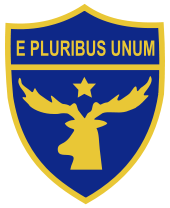Scouts Battalion
| Scouts Battalion Scoutspataljon | |
|---|---|
 Scouts Battalion insignia | |
| Active |
1918–1940 2001–present |
| Country |
|
| Branch |
|
| Type | Mechanized infantry |
| Size | Battalion |
| Part of | 1st Infantry Brigade |
| Garrison/HQ | Paldiski |
| Motto | E Pluribus Unum |
| Anniversaries |
Formed: 21 December 1918 Restored: 29 March 2001 |
| Engagements |
Estonian War of Independence Iraq War War in Afghanistan |
| Commanders | |
| Current commander | Major Andrus Merilo |
| Notable commanders | Friedrich-Karl Pinka |
The Scouts Battalion (Estonian: Scoutspataljon) is a battalion of the Estonian Land Forces. It is a part of the 1st Infantry Brigade and acts as its rapid response unit. The battalion is currently based at Paldiski and is commanded by Major Andrus Merilo.
History
Estonian War of Independence
In November 1918 an Estonian American entrepreneur and scouting enthusiast Henry Reissar returned to Estonia and turned to the Ministry of Defence (then Ministry of War) with a proposition to form a voluntary military unit financed by himself in order to help defend Estonia. Receiving such permission the unit was formed on 21 December 1918 in Viljandi, where the first volunteers took their oath in the ruins of Viljandi Castle and Friedrich-Karl Pinka was appointed as the commander of the newly formed unit.[1] On 3 January 1919 the company-sized unit was sent to the front against the Red Army. The Scouts fought mostly alongside armoured train units and acquitted themselves well in combat, manifesting greater morale than the regular conscript units. On 1 December 1919 the Scouts Regiment (Estonian: Scoutspolk) was formed as a part of the Armoured Train Division. The Scouts Regiment took part of the attack against Krasnaya Gorka fort and defending Narva in winter 1919.
1920–1940
After Peace Treaty of Tartu was signed, many servicemen were demobilized and returned to civilian life. From 1921-28 the Scouts unit was reduced in size and continued to serve as a part of the 2nd, 5th, 6th and 10th Infantry Regiment. On 1 October 1928 the unit was renamed Scouts Single Infantry Battalion. The battalion was based at Tallinn, from where it was moved to Uuemõisa, Haapsalu in 1932. After the Soviet occupation in 1940 the battalion was disbanded.[2]
2001–present
Scouts Battalion was restored on 29 March 2001 as a fully professional unit. The Scouts Battalion has actively participated in international operations together with other NATO, European Union and United Nations member states, including the Iraq War and the War in Afghanistan.[1] The battalion is currently equipped with Patria Pasi armoured personnel carriers. In 2015 the battalion will be re-equipped with CV90 infantry fighting vehicles.[3]
Current structure
Structure as of 7 August 2013:[4]
- Battalion Headquarters
- A Infantry Company
- B Infantry Company
- C Infantry Company
- Combat Support Company (anti-tank missile, grenade launcher, mortar and engineer platoons)
- Staff and Support Company (staff, reconnaissance, medical, support and sniper units)
List of commanders
| Career | Commander |
|---|---|
| 2001–2004 | Artur Tiganik |
| 2005–2006 | Indrek Sirel |
| 2006–2009 | Aivar Kokka |
| 2009–2013 | Vahur Karus |
| 2013–present | Andrus Merilo |
See also
| ||||||||||||||||||||||||||||||||||||||||||||||||||||||||||||||||||||||||||||||||||||||||||||||||||||||||||||||||||||||||||||||||||||||||||||||||||
| ||||||||||
References
- ↑ 1.0 1.1 "Scoutspataljon" (in Estonian). Estonian Defence Forces.
- ↑ Õun, Mati. 2001. Eesti sõjavägi 1920-40. Tallinn: Tammiskilp, page 29-30
- ↑ http://epl.delfi.ee/news/eesti/scoutspataljon-valmistub-umber-relvastuma.d?id=68387437>
- ↑ "Scoutspataljoni põhimäärus" (in Estonian). Riigi Teataja.